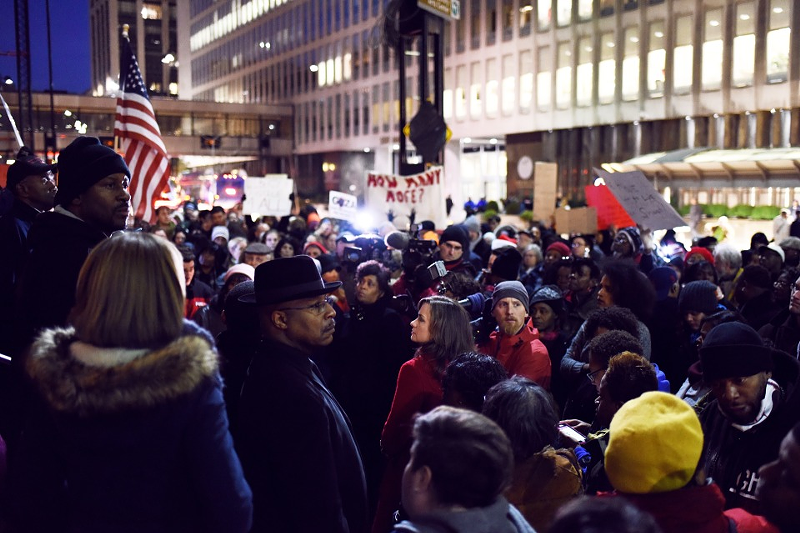
The City of Cincinnati last month paid $90,000 to settle a lawsuit brought by a demonstrator arrested during a November 2014 rally protesting the police shooting death of Michael Brown in Ferguson, Missouri, city documents reveal.
Cerissa Newbill was one of several people arrested while marching after a rally on the evening of Nov. 25 that year. The march, which started after a rally at the Potter Stewart U.S. Courthouse, moved through the streets of downtown, the West End and Over-the-Rhine. A small contingent of marchers briefly shut down I-75 before the protest wound down near Sycamore and Main streets downtown.
Newbill was not among those protesters, but was arrested later on Main Street.
As the march was ending, Cincinnati Police Sergeant Shawn George arrested Newbill on orders from CPD Captain Russell Neville. In a deposition, Neville said Newbill stepped into the street three times after the crowd of roughly 35 remaining protesters was told not to do so.
"I had officers approach her," Neville said in testimony at Newbill's misdemeanor trial, "and as they attempted to speak with her, she refused to get back out of the street and onto the sidewalk, and that's really what led to her being cited. She just was not pleasant."
Newbill denies this, saying she entered the street only at crosswalks and stayed calm prior to and during her arrest. She says she never saw Neville or the other officers involved before she was arrested.
"I was walking, protesting alongside with my friend, Orlando," Newbill said in a deposition. "I was approached by an officer who approached me as I was marching on the sidewalk and he said, 'You are under arrest.' I had never seen him before he had approached me... I was in a state of confusion, really."
A third CPD officer, Anthony White, took Newbill to the Hamilton County Justice Center. Police charged Newbill with disorderly conduct, a fourth-degree misdemeanor. She spent three days in jail, including Thanksgiving day, before she was able to post bond. White signed off on the complaint saying Newbill had been threatening and did not obey orders, though White and arresting officer George did not see the events that Neville described.
“Essentially, I was arrested for being out there exercising my first amendment rights peacefully," Newbill says. "I was with other protesters, nothing happened out of the ordinary. I was protesting with a friend of mine and we were side by side the entire protest. Nothing was going on to prompt the police to do what they did."
Newbill spent multiple days in jail, including Thanksgiving, before she was released.
"When I went to bail myself out, I found out they had decided to attach the electronic monitoring devices to everyone," she says. "I thought that was for people who were flight risks or whatever. That’s what kept us in there longer than we should have been in there.”
Even after she left the Hamilton County Justice Center, the case dragged on for seven months of court appearances and shifting charges.
On June 1, 2015, Hamilton County prosecutors dropped the original charges against her, which were brought on the basis that she had "recklessly caused alarm to another by insulting, taunting or challenging another under circumstances in which that conduct is likely to provoke a violent response," a charge that Neville admitted in a deposition was in error.
Newbill had challenged those charges, demanding a jury trial. On June 2, prosecutors issued a new, amended disorderly conduct charge to a minor misdemeanor for jaywalking, which does not allow for a jury trial. During a subsequent bench trial, Hamilton County Municipal Court Judge Richard A. Bernat found Newbill not guilty on the charges.
Newbill then filed a lawsuit against Neville, George, White and the City of Cincinnati alleging that her First, Fourth and 14th Amendment rights were violated. In September last year, Judge Michael Barrett of the U.S. District Court in Cincinnati granted the city summary judgement on some of Newbill's claims, but ruled that other claims around false arrest, malicious prosecution and First Amendment retaliation had sufficient grounding to move forward. In that decision, Barrett pointed out some discrepancies appeared to exist between depositions given by the officers involved.
"This is small, and it’s a part of the reason I was out there that day — the injustices that go on in this system," Newbill says. "I’m a taxpaying citizen just out exercising my rights. We were just walking and chanting. There hasn’t been accountability. That’s why it continues, even with the settlement we got. It took me a long time to agree on a settlement, because it’s not about the money for me. It’s about getting them to change. It’s not even fair that taxpayers pay the costs of this.”
The city settled the lawsuit on Jan. 2 this year. Generally, such settlements aren't necessarily an admission of wrongdoing.
"When it is appropriate to settle a case, the city strives to resolve them fairly, justly and with the least economic cost to the taxpayers of the City of Cincinnati," Cincinnati City Solicitor Paula Boggs Muething wrote in a memo to Cincinnati City Manager Patrick Duhaney Feb. 13. "Each case is judged by its own particular strengths and weaknesses. There are a host of factors that lawyers must consider when determining the best resolution for a particular case."





